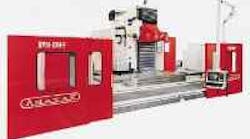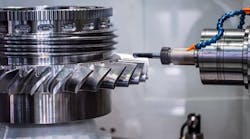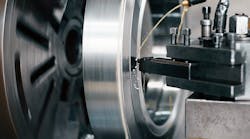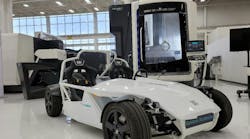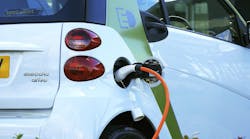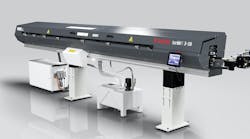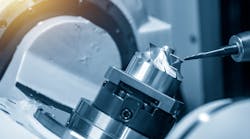Shop flexibility and product quality are establishing Spanish manufacturers as world leaders in the automotive machine-tool market.
This fixed-table machining center is a typical product of Spanish manufacturer Anayak, but the company stresses a philosophy of flexibility and offers custom design.
Group Danobat, headquartered in Elgoibar, Spain, incorporates six companies, eight plants, and 11 branch offices. The group is part of yet another consortium called the Mondragon Corporation Cooperative.
Zayer's 20 KFU fixed-bed machining center has ground boxways and uses rack-and-pinions as a part of the company's 'better accuracy' policy. Zayer's focus on quality is strategic considering its machines have a great deal of competition from other similar-sized manufacturers for the automotive market.
Engineers at ONA's in-house R&D center in Bizkaia, Spain, offer training and technical assistance and maintenance to the customer.
The typical Spanish manufacturer, located in Basque country, is a small, ISO-9000-certified plant that casts material, produces components, or assembles machine-tools for the automotive export industry. These relatively small companies are often able to survive in the export market by banning together to form larger groups and conglomerates. In this way, companies can maintain the flexibility inherent in a smaller shop while combining resources for better distribution, R&D, and training. These cooperative efforts are essential contributors to Spain's expanding role as a major world player in machine tools for the automotive market.
The 1991 recession in the European Union and Japan hit Spain hard, but the country is back on its feet and ready to do business. National production went up 23% in 1996 to total $802 million. Most of Spain's production, 63.5% in 1996, is for export with 16% going to Germany, followed by France at 11%, and then the U.S. at 8%. These numbers put the country in 5th place in the European Union and in 11th place on a worldwide scale.
Many Spanish companies are looking to seriously expand exports to the U.S., and the heavy-duty CNC milling machine manufacturer, Nicolas Correa, is one of them. According to export manager Manuel Andres, "The U.S. was the 5th largest market for our company in 1996, but when 1997 figures come out, the U.S. will be the second largest." NC currently has a presence in the U.S. with two of its service engineers at Seaberg Precision Corp. in Deer Park, N.Y., and it plans to open its own office soon in the New York area.
Just as exporting pays the bills for Spain's machine-tool economy, so does its involvement in the automotive industry. The country is the 6th largest supplier for automotive with more than 50% of its nation's production geared toward that market and much of the remainder focused on aerospace. Major customers include Chrysler, General Motors, Ford, Mercedes Benz, Volkswagen, Peugeot, Renault, Citroen, Volvo, Nissan, Boeing, and Airbus.
Spain's machine-tool association
The largest organization assisting small companies and company groups in promotion, distribution, and export is AFM-The Machine-Tool Manufacturers Association of Spain. This association helps represent 90 of the 115 companies located in the Basque sector. It helped represent 78 companies at EMO, and is connected with the Spanish machine-tool organization in Chicago (NTS) that has a consistently strong presence at IMTS.
The AFM's headquarters in San Sebastion house one of five govern-ment-sponsored R&D centers throughout Spain. This technologically up-to-date center had a recent addition of a training facility which is filled with numerous new CNC machines. This center, which rivals any top-notch U.S. facility, is sponsored 40% by the government with the rest coming from the 90 AFM companies. The funding for the newest technology is possible, according to commercial promotion department manager Guzman Martin, because of the generous government support, and the center’s sale of its older machines to other, less sophisticated, Spanish training schools.
The AFM training center offers night-hour application assistance for companies (which helps generate revenue) and then holds classes during the day for training. Classes are primarily geared toward the country's young students, who are discovering manufacturing as a new career path offering money and security. However, employees of member companies are welcome to come for training. The center also has cleanroom and metrology service available to companies without those capabilities.
Smaller, but mighty
The AFM likes to stress to international customers that, because of typical plant size, flexibility is one of the essential advantages that the Spanish manufacturer has over its world competitors. Miguel Angel Mon-real, Area Sales Manager for Anayak, one of Spain's successful small manufacturers of machine tools, agrees. "We have 100 people in 800 m 2 . We have offered personal service and flexible design for 25 years."
Anayak is a Gipuzkoa, Spain, manufacturer of mostly bed-type, fixed-table machine tools. Machines come with 3 or 5 axis rotating spindles. With 85% of production going to export, Monreal says most sales of five axis heads are in Germany, while the U.S. continues to request a 3-axis head. As is typical to many Spanish manufacturers, parts for machining and assembly come from Spain, but most gears, motors, and other technical parts arrive from Germany.
Anayak has been dedicated to the U.S. market for some time, having a 7-person-staffed office in Anaheim, Calif., for the past 7 years. According to Monreal, the company already has 1,000 of its machines being used in the U.S. under the Doall name. "The proximity of our service keeps us up with U.S. demands and our size keeps us flexible,'' reiterates Monreal. Current customers include Ford, Columbia Machines, and Kurt Manufacturing.
The group advantage
One smaller firm took advantage of the benefits of group security and development in 1963 and has prospered under the Mondragon Corporation Cooperative. Danobat began as an individual company when it joined the cooperative and was the basis for the development of the Danobat Group—composed of the original Danobat, Danobat-Soraluce, Estarta, Goiti, Lealde, and Soraluce.
The Danobat Group has 672 employees spread throughout 8 plants and 11 branch offices. The Group, which acts as its own corporation, also has an extensive R&D facility, partially dedicated to working on improvements for company Danobat's 3 and 5-axis indexing head.
The compact steel head offered on Danobat machines contains only mechanics and hydraulics. All electronic components like controls and sensors are located outside the head for easy maintenance. According to the Danobat Group export director Oskar Urdangarin, the company also guarantees head quality by testing each completed 3 and 5- axis for a total of 150 hours while running through-the-spindle coolant. "This is our way of making sure there are never out of box failures," says Urdangarin. The company also has an assembly plant for constructing its oversized machines.
The last three years have seen an annual doubling of orders for the Danobat Group. As of December 1996, the balance sheet showed a turnover of $101 million, 36% generated from the domestic market and 64% from foreign markets. Currently, 75% of exports go to Europe, but according Urdangarin, the company is seriously expanding its market in China and the U.S. for 1998.
Flexibility with accuracy
There is no shortage of technical expertise in the small Basque region as illustrated by Zayer, a 240-person business that specializes in heavy-duty cutting machines. According to general manager Eduardo Perez, the Vitoria-Gasteiz company is primarily concerned with making sturdy, accurate machines. "Our machines all have box ways with mostly 3-axis indexing heads, and we use ball and screws not rack-and-pinion. We feel it's more accurate that way." On machines where length demands a fixed bed, tables are machined in one piece up to 14 m long for greater stability. The company also grinds its own boxways.
Perez feels flexibility helps Zayer focus on making quality machines. "We only make a machine when we have an order. This makes us more flexible to individual manufacturers needs."
The company currently makes 30 to 40 CNC machines per year. Twenty-five engineers work on CAD/CAM in the FEA/ R&D center to help the company improve the design and development of its products. According to Perez, the company's in-house FEA lab was integral in Zayer's recent making of a six-axis machine tool for NASA. With 80% of production exported in 1996, Perez expressed his company's interest in the U.S. market. However, most of the 80% went to Germany, Italy, and France. Products are available in the U.S. through Hermes in Fairfield, N.J.
Recognized success
Probably the most recognized Spanish firm is ONA EDM, which develops, designs, and builds all its equipment, including power generators, CNC hardware and software, and filtering units.
ONA America is the company's American branch operating out of Dayton, Ohio.
The plant in Bizkaia, Spain is mostly for assembly, R&D, and administration. The plant, however, does have a testing and application lab below the in-house R&D center. This is where it does its own thorough testing of PC boards, supplied wires, machine-bound controls, motors, and cabinets. Testing of the controls includes a 42° C test run.
ONA has been selling EDMs since their inception in the early 50s and keeps a showroom full of its older models—all running. The company stresses that this room is not simply for show, but also for re-pair, since it is willing to provide service on machines from 30 years back.
